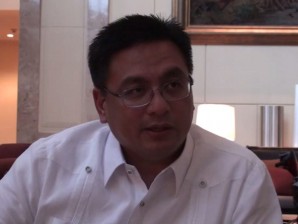MANILA, Philippines—With its intensified “Run After the Smugglers,” or RATS campaign, the Bureau of Customs’ program against smuggling is a “work in progress,” according to BOC Commissioner Ruffy Biazon.
In a phone interview, Biazon made the assertion on Thursday as he also disputed Inquirer columnist Rigoberto Tiglao’s claim that “smuggling in the country is at its worst under the President Aquino’s administration.”
“It’s true smuggling is still one of the biggest problems facing the Bureau of Customs. However, it’s not true that we’re not addressing the problem,” said the BOC head.
Biazon put the blame mainly on “about 50 percent of Customs operations still being done manually, as well as some antiquated Customs laws.”
But the former Muntinlupa City legislator emphasized that “with our ongoing shift to automation and other technical strategies, we’re doing our best to plug the operational loopholes.”
In his November 15 column “Outlook,” Tiglao claimed, among other things, that smuggling in the Philippines averaged $19.6 billion annually, “an explosion from the comparable figures of $3.1 billion and $3.8 billion yearly during the terms of Presidents Joseph Estrada and Gloria Macapagal-Arroyo, respectively.”
“In Mr. Aquino’s first two years in office, the value of smuggling totaled $39.2 billion, more than the $35.6 billion during Arroyo’s nine years in office,” he also said.
According to Tiglao, the estimates were “based on data from the International Monetary Fund’s Direction of Trade Statistics.”
Biazon said they would validate Tiglao’s IMF data-related disclosures.
However, he said the columnist’s “other claims have been addressed by the Bureau of Customs,” such as the alarm supposedly raised by an unnamed group of trade associations that “smuggling of agricultural products is the worst in the last 20 years.”
Biazon pointed out that the BOC’s recent seizure of 420,000 50-kilogram bags of Indian rice that were abandoned at the Subic Bay Freeport in Zambales was the agency’s “biggest smuggled rice haul.”
In a statement issued earlier, he noted there was “clearly a grand design to illegally ship the 420,000 bags of imported rice into the country as not only was the importation undocumented, but its consignee tried to make it appear it was a transshipment originally bound for Indonesia.”
“Had we not stopped the illegal rice importation, it could have caused tremendous damage to our local farmers,” said Biazon. “Add to that other recent illegal rice importations, like the Vietnam rice shipments seized at the Subic and Legazpi ports.”
The BOC, he vowed, would never allow unscrupulous traders to exploit the privileges offered by the country’s various free trade zones, like Port of Subic, to be their staging points for smuggling.
Other BOC districts and ports nationwide are “keeping a close watch over suspected smugglers and erring traders,” said Biazon.
On Tiglao’s tirades against the agency’s failure to meet its revenue collection targets, Biazon explained, “We look very bad every time we missed our monthly targets although we were able to surpass our targets year on year.”
“Higher targets are set for the BOC to collect more revenues. But we should to understand that these collection targets are so stretched, thus making it difficult for the agency to meet them,” he said.
Aside from the BOC’s unrealistic targets, Biazon cited international trade, peso fluctuation and leakages from smuggling activities and corruption as among the many factors why their revenue collection goals might not be achieved.
According to Tiglao, “the runaway smuggling in the country has cut deep into government revenues from import duties.”
“In 2011, while the value of imports rose 10 percent from the previous year, collected duties increased only by a measly 2.2 percent. Biazon, however, blames his agency’s weak performance on what he claimed was the ‘unrealistic targets’ set by the (interagency) Development Budget Coordination Committee, conveniently failing to explain that these goals are based on conservative estimates of the value of exports this year,” said the Inquirer columnist.
Quoting an unnamed official of a trade group, Tiglao added, “Either the smugglers are running circles around Biazon, or the tuwid na daan is really a crooked one.”
In September, Biazon told a BOC media forum that the agency was “handicapped by negative perceptions and prejudgment” that it was one of the most corrupt agencies of the government.
He said the BOC was “faced with a challenge of overcoming negative public perceptions.”
Biazon, however, said he had “also come across positive comments from the public, saying there have been positive changes in in the bureau. So it’s still a continuing struggle.”
At the same time, he urged the public to “keep an open mind on the reforms and changes that we’re doing at the BOC.”
“We’ve been trying our best to improve the BOC image,” he said, adding that he was confident “it could be done, first, through good performance and second, how you convey the positive image to the public.”
Meanwhile, some Customs old-timers brushed aside Tiglao’s column, saying it was “more like some drum-beating for an upcoming anti-smuggling summit.”
“Connected to that is their lobby for certain Customs policy proposals,” quipped one of the BOC insiders.


